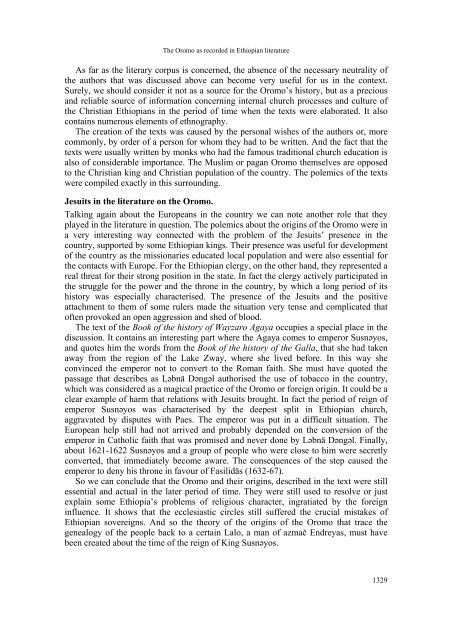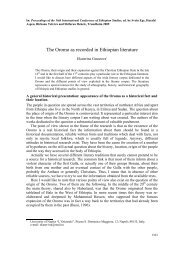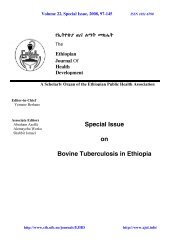Ekaterina Gusarova - The Oromo as recorded in Ethiopian literature
Ekaterina Gusarova - The Oromo as recorded in Ethiopian literature
Ekaterina Gusarova - The Oromo as recorded in Ethiopian literature
Create successful ePaper yourself
Turn your PDF publications into a flip-book with our unique Google optimized e-Paper software.
<strong>The</strong> <strong>Oromo</strong> <strong>as</strong> <strong>recorded</strong> <strong>in</strong> <strong>Ethiopian</strong> <strong>literature</strong><br />
As far <strong>as</strong> the literary corpus is concerned, the absence of the necessary neutrality of<br />
the authors that w<strong>as</strong> discussed above can become very useful for us <strong>in</strong> the context.<br />
Surely, we should consider it not <strong>as</strong> a source for the <strong>Oromo</strong>’s history, but <strong>as</strong> a precious<br />
and reliable source of <strong>in</strong>formation concern<strong>in</strong>g <strong>in</strong>ternal church processes and culture of<br />
the Christian <strong>Ethiopian</strong>s <strong>in</strong> the period of time when the texts were elaborated. It also<br />
conta<strong>in</strong>s numerous elements of ethnography.<br />
<strong>The</strong> creation of the texts w<strong>as</strong> caused by the personal wishes of the authors or, more<br />
commonly, by order of a person for whom they had to be written. And the fact that the<br />
texts were usually written by monks who had the famous traditional church education is<br />
also of considerable importance. <strong>The</strong> Muslim or pagan <strong>Oromo</strong> themselves are opposed<br />
to the Christian k<strong>in</strong>g and Christian population of the country. <strong>The</strong> polemics of the texts<br />
were compiled exactly <strong>in</strong> this surround<strong>in</strong>g.<br />
Jesuits <strong>in</strong> the <strong>literature</strong> on the <strong>Oromo</strong>.<br />
Talk<strong>in</strong>g aga<strong>in</strong> about the Europeans <strong>in</strong> the country we can note another role that they<br />
played <strong>in</strong> the <strong>literature</strong> <strong>in</strong> question. <strong>The</strong> polemics about the orig<strong>in</strong>s of the <strong>Oromo</strong> were <strong>in</strong><br />
a very <strong>in</strong>terest<strong>in</strong>g way connected with the problem of the Jesuits’ presence <strong>in</strong> the<br />
country, supported by some <strong>Ethiopian</strong> k<strong>in</strong>gs. <strong>The</strong>ir presence w<strong>as</strong> useful for development<br />
of the country <strong>as</strong> the missionaries educated local population and were also essential for<br />
the contacts with Europe. For the <strong>Ethiopian</strong> clergy, on the other hand, they represented a<br />
real threat for their strong position <strong>in</strong> the state. In fact the clergy actively participated <strong>in</strong><br />
the struggle for the power and the throne <strong>in</strong> the country, by which a long period of its<br />
history w<strong>as</strong> especially characterised. <strong>The</strong> presence of the Jesuits and the positive<br />
attachment to them of some rulers made the situation very tense and complicated that<br />
often provoked an open aggression and shed of blood.<br />
<strong>The</strong> text of the Book of the history of Wayzaro Agaya occupies a special place <strong>in</strong> the<br />
discussion. It conta<strong>in</strong>s an <strong>in</strong>terest<strong>in</strong>g part where the Agaya comes to emperor Susnəyos,<br />
and quotes him the words from the Book of the history of the Galla, that she had taken<br />
away from the region of the Lake Zway, where she lived before. In this way she<br />
conv<strong>in</strong>ced the emperor not to convert to the Roman faith. She must have quoted the<br />
p<strong>as</strong>sage that describes <strong>as</strong> Ləbnä Dəngəl authorised the use of tobacco <strong>in</strong> the country,<br />
which w<strong>as</strong> considered <strong>as</strong> a magical practice of the <strong>Oromo</strong> or foreign orig<strong>in</strong>. It could be a<br />
clear example of harm that relations with Jesuits brought. In fact the period of reign of<br />
emperor Susnəyos w<strong>as</strong> characterised by the deepest split <strong>in</strong> <strong>Ethiopian</strong> church,<br />
aggravated by disputes with Paes. <strong>The</strong> emperor w<strong>as</strong> put <strong>in</strong> a difficult situation. <strong>The</strong><br />
European help still had not arrived and probably depended on the conversion of the<br />
emperor <strong>in</strong> Catholic faith that w<strong>as</strong> promised and never done by Ləbnä Dəngəl. F<strong>in</strong>ally,<br />
about 1621-1622 Susnəyos and a group of people who were close to him were secretly<br />
converted, that immediately become aware. <strong>The</strong> consequences of the step caused the<br />
emperor to deny his throne <strong>in</strong> favour of F<strong>as</strong>ilidäs (1632-67).<br />
So we can conclude that the <strong>Oromo</strong> and their orig<strong>in</strong>s, described <strong>in</strong> the text were still<br />
essential and actual <strong>in</strong> the later period of time. <strong>The</strong>y were still used to resolve or just<br />
expla<strong>in</strong> some Ethiopia’s problems of religious character, <strong>in</strong>gratiated by the foreign<br />
<strong>in</strong>fluence. It shows that the ecclesi<strong>as</strong>tic circles still suffered the crucial mistakes of<br />
<strong>Ethiopian</strong> sovereigns. And so the theory of the orig<strong>in</strong>s of the <strong>Oromo</strong> that trace the<br />
genealogy of the people back to a certa<strong>in</strong> Lalo, a man of azmač Endrey<strong>as</strong>, must have<br />
been created about the time of the reign of K<strong>in</strong>g Susnəyos.<br />
1329







